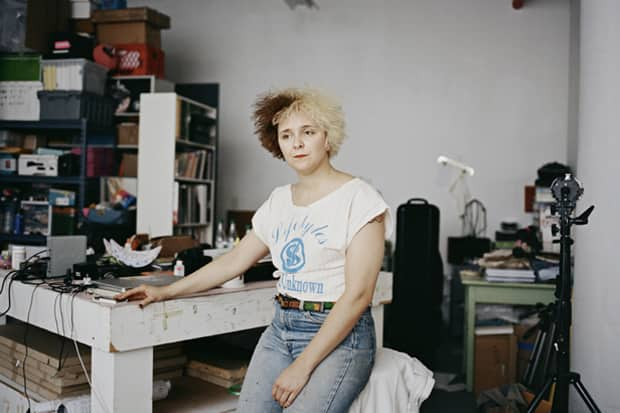 K8 Hardy brings “fashion” to the Whitney Biennial.
K8 Hardy brings “fashion” to the Whitney Biennial.
K8 Hardy describes herself as a “producer” as much as an artist, conceptualizing, directing and starring in a variety of disparate, dynamic projects ranging from camp, faux documentaries, music videos for bands like MEN and zines filled with photographs of herself posing in costume. Despite her reach, there’s one unifying theme throughout: clothing is almost always a huge part of her visual language. Concocting thrift store looks for the different characters she inhabits, she’ll wear a brown fur shawl, leopard-print tights and a purple wig to play an anthropomorphized bobcat in a video with Fritz Haeg in 2008, or don a black beret and turtleneck to play a lesbian, feminist news anchor. This March, Hardy will put on her biggest performance yet as a first-time participant in the Whitney Museum of American Art’s 76th Biennial. In addition to exhibiting sculptures and photographs in the main show, she’ll refresh the runway with a one-off conceptual fashion show at the museum in May, complete with real models and a catwalk constructed by fellow Biennial participant, Oscar Tuazon. From what we’ve gathered from our conversation with Hardy about art and identity, it’s bound to be the punkest, most academic fashion show of the season.
So, you’re bringing fashion to the Whitney Biennial? mean, yes, but it’s also more like wardrobe than fashion. What’s the difference? Well, fashion items aren’t being produced. The models will have wardrobe on, but I’m not producing a line. Fashion is an industry. It’s related to product.
Is making work for the massive audience at the Whitney Biennial intimidating? It’s really nerve-racking. There’s a lot more scrutiny, and you never know if people are going to like your work or hate it, but you can almost guarantee that some people will like it and some people will hate it. I want to do a good job, but I also want to take risks. I’m not always 100 percent sure in the work I make. So it’s intense, but I feel like I need things to be intense to do what I need to do as an artist.
So why stage a runway show? I’m attracted to ready-made and popular forms as a way of communicating and having a dialogue. I don’t feel like that’s my one motivating force, though. It’s just one of the tools in my toolbox. I had a little bit of insecurity about it for a while, because I know it will rub some people the wrong way. People are going to say, Oh, she’s doing a runway show at the Whitney Biennial, that’s fucked up. But that’s not my job as an artist.
Is fashion different than art? Is someone like Alexander McQueen an artist as much as a fashion designer? I don’t really care much for the question of whether a person is an artist or not, but I know the fashion world cares a shit-ton. They cannot stop talking about whether a certain photographer or designer is an artist, and who is and who isn’t, or who’s commercial. It’s really exhausting.
How did your interest in clothes develop? I was a punk and a mod, so I’m really into style as a marker of politics and outsiderness, and as a way of flagging and signaling different things. And it really matters how you dress where I’m from in Texas. I was taught that your style is tied to your morality, where dressing out of line really is a political statement. So dressing punk or gay or whatever made you an outsider. That’s where my interest comes from. That’s why I’m compelled to be part of that dialogue.
And girls are told from a young age to care about clothes. They’re told all kinds of things. I’m interested in how we consume images and massive amounts of capitalism.
Can fashion ever be feminist? Is Anna Wintour a feminist? Anna Wintour is not a feminist, and I don’t care if she thinks she is one or not. [Fashion] deals with women, and is made by women, and claims to deal with their issues, and that’s what is possibly fruitful. Images of women are fucked up. But if artists completely reject worlds just because they are fucked up, how are we going to get further along?
